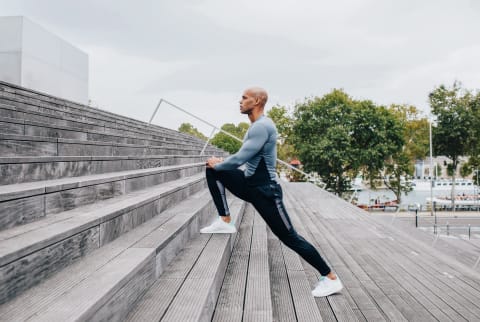Advertisement
Why Do Our Muscles Shake After A Workout & How Do We Make It Stop?

Ray Bass is the associate movement and wellness editor at mindbodygreen and a NASM-Certified Personal Trainer. She holds a degree in creative writing from the University of Pennsylvania, with honors in nonfiction.

I was only a year out of college the first time I tried CrossFit. I had (almost) no idea what I was doing and what the workout would be like, but at the risk of sounding like a cult member, I loved it. I wasn't into strength training on my own, and I liked being taught how to do a movement, doing it, and then being praised if I did it correctly. I guess I missed having a coach like I did every season during high school.
But after the workout, I remember my legs shaking. I chalked it up to working hard or trying something new until it started happening after a lot of different types of workouts. The workouts were challenging, but still, why were my legs shaking? Was I OK?
Don't worry, I was fine—there's actually a reason behind why our legs, or any muscles, shake after certain workouts. Here's why it happens and what to do about it, according to the experts.
Why do our legs shake after a workout?
According to Sarah Kostyukovsky, P.T., DPT, OCS, and certified personal trainer, "Muscle shaking occurs when our muscles are unable to generate sustained contraction. It's usually our body's response to body fatigue, but it could also be an electrolyte imbalance or low glucose."
NYC-based, NASM-certified personal trainer Lauren Kanski agrees, explaining that shaking muscles primarily come from low blood glucose and muscle fatigue.
"Low blood glucose, or hypoglycemia, can come from working out in a fasted state or working out for really long periods of time without refueling," says Kanski. "Our bodies need ATP, or energy, to function, and one way we get that is from our muscles and liver, in the form of glucose. As our glucose gets used up, we then rely on fat as the fuel required to produce ATP. This transition between energy pathways can cause shakiness, dizziness, nausea, brain fog, and more."
While the low blood glucose explanation is a bit more scientific in nature, muscle fatigue is more straightforward. Kanski says that if we overwork our muscles, don't warm them up well enough, isometrically load them for long periods of time, or work them until complete failure, that's going to cause muscle fatigue and, therefore, shaking.
What to do if your muscles shake post-workout.
The good news is that, most of the time, the muscle shaking will stop once you stop using the muscles that are shaking. Kostyukovsky adds that if you improve your muscular strength through continued strength training, your body should adapt and not fatigue at the same load that previously caused the shaking. In other words, if you keep doing the workout that made you shake, you'll eventually stop shaking. She also cautions that if your muscles start shaking during your workout, that could be a sign you should stop.
"Once you're fatigued and your muscles start shaking, you are at greater risk for injury, so it's not ideal to keep pushing through the workout."
Kanski's top tips for avoiding muscle shaking are to properly fuel for the predicted intensity of your workouts, stay hydrated, and warm up your muscles. She also advises against overloading our systems too quickly, and instead focus on taking adequate rest periods and doing some sort of linear conditioning to build the body up to max capacity efforts.
So, are shaking muscles after a workout normal?
If you're reading this mid muscle shake, you can do so knowing that it's normal, and even common, if you're doing a hard workout.
"Shaking is common, and your body should return to baseline conditions a couple of hours after your workout," Kanski says. "If it doesn't, consulting a doctor may be necessary to avoid cardiac arrest or sickness."
Kostyukovsky echoes this warning: "It's normal for our muscles to get fatigued and become unable to perform at 100 percent. But if you're having other symptoms with the shaking, like lightheadedness or heart palpitations, then concern is warranted, and you should seek medical attention."
Watch Next
Enjoy some of our favorite clips from classes
Enjoy some of our favorite clips from classes
What Is Meditation?
Mindfulness/Spirituality | Light Watkins
Box Breathing
Mindfulness/Spirituality | Gwen Dittmar
What Breathwork Can Address
Mindfulness/Spirituality | Gwen Dittmar
The 8 Limbs of Yoga - What is Asana?
Yoga | Caley Alyssa
Two Standing Postures to Open Up Tight Hips
Yoga | Caley Alyssa
How Plants Can Optimize Athletic Performance
Nutrition | Rich Roll
What to Eat Before a Workout
Nutrition | Rich Roll
How Ayurveda Helps Us Navigate Modern Life
Nutrition | Sahara Rose
Messages About Love & Relationships
Love & Relationships | Esther Perel
Love Languages
Love & Relationships | Esther Perel











